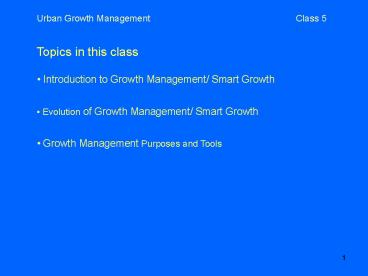Urban Growth Management Class 5 - PowerPoint PPT Presentation
1 / 6
Title:
Urban Growth Management Class 5
Description:
Introduction to Growth Management/ Smart Growth. Evolution of Growth ... Ramapo, NY 1969 permits by point system- adequate public facilities requirement ... – PowerPoint PPT presentation
Number of Views:272
Avg rating:3.0/5.0
Title: Urban Growth Management Class 5
1
Urban Growth Management Class 5
- Topics in this class
- Introduction to Growth Management/ Smart Growth
- Evolution of Growth Management/ Smart Growth
- Growth Management Purposes and Tools
2
Urban Growth Management Class 5
Introduction to Growth Management/ Smart
Growth Growth management in response to sprawl,
suburbanization, sudden increase in population,
environmental degradation, fiscal
stress. Traditional zoning use and bulk of
land GM- timing pace type and sequencing of
growth Growth management at local as well as at
state level
3
Urban Growth Management Class 5
- Evolution of Growth Management/ Smart Growth
- 1960s and 70s
- Growth Control by local jurisdictions in response
to rapid population growth and development - Examples
- Ramapo, NY 1969 permits by point system-
adequate public facilities requirement - Petaluma, CA 1972 cap of 500 housing units/
year and - Boulder, CO 1976 control of rate of growth
(initially 1.5 to 2, but since 1995 capped at
1) - 70s and 80s
- Proliferation of State Growth Management Programs
(roots in environmentalism environmental
sustainbility) - Examples
- Florida, Vermont, Hawaii
4
Urban Growth Management Class 5
Evolution of Growth Management/ Smart
Growth 90s Proliferation of Regional Planning
Organizations Regulatory Power Minneapolis-
Saint Paul, MN (The Metropolitan Council),
Portland (METRO) Without Regulatory Power San
Diego Association of Governments (SANDAG) Growth
Management Strategy Emergence of the term
Smart Growth more tool based and urban form
oriented. Focused on Open space
preservation Mixed use Variety of housing
inclusionary housing job- housing balance More
transportation choices In-fill and redevelopment
5
Urban Growth Management Class 5
Growth Management Purposes and Tools Economic Co
rrect market inefficiencies true/marginal cost
impact fees Optimal provision of services
sequence and timing of development adequate
facility requirement concurrency urban service
area Cost efficient development pattern more
compact development in-fill revise development
standards Physical More efficient use of land
more compact development up zoning revise
development standards More transportation choices
density and public transportation More housing
choices mix of housing
6
Urban Growth Management Class 5
Growth Management Purposes and Tools Environmenta
l Conserve energy compact development public
transportation Protect open space urban growth
boundary farmland preservation down zoning
manage direction and speed of development Protect
environmental degradation compact development
less fuel less land revise zoning and
development standards Social More livable
environment walk able, better design less
monotonous mix of uses revise zoning and
development standards More healthy environment
walk able less pollution More equitable not
against elderly, children and poor revitalize
inner cities































